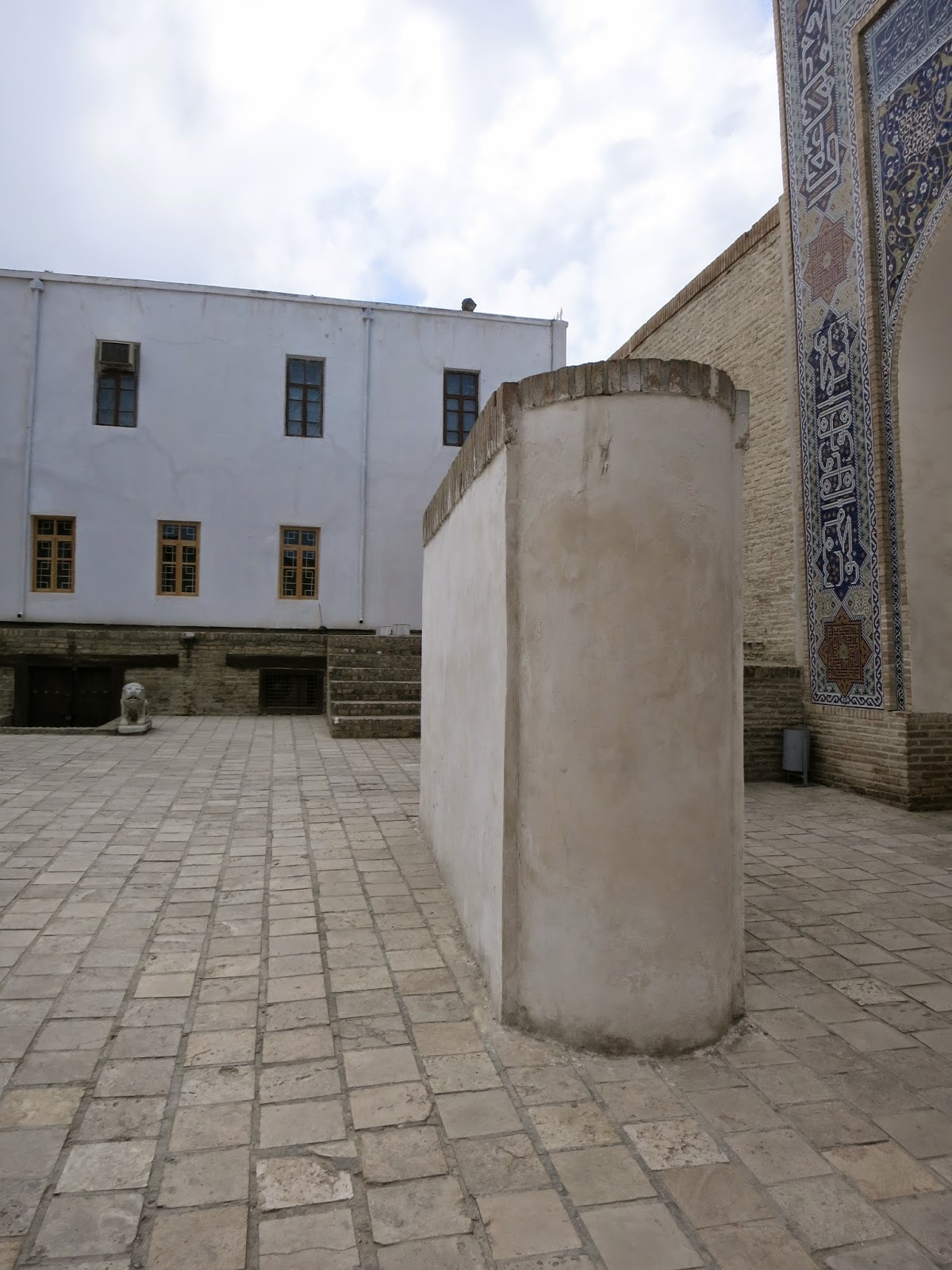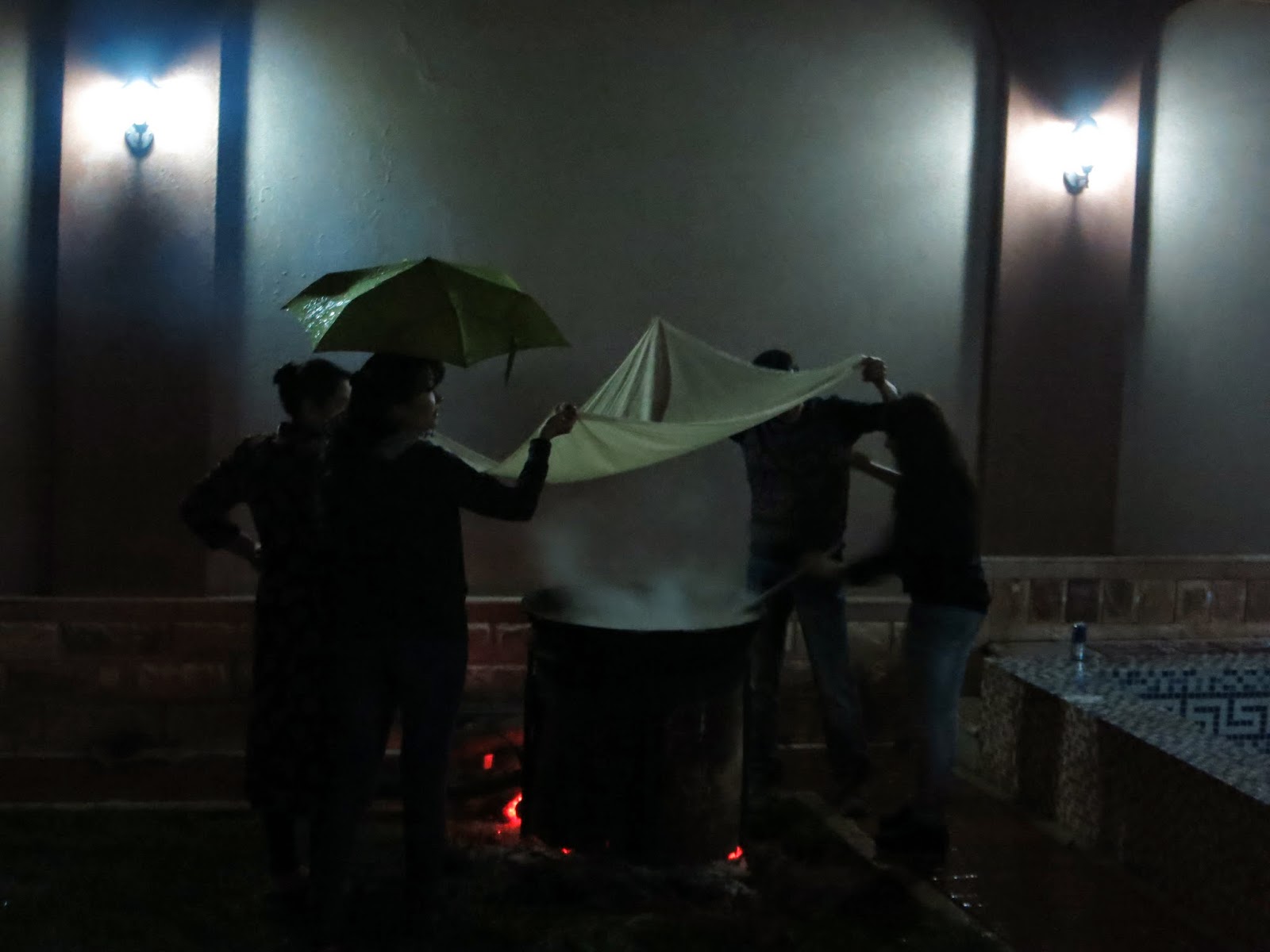The Easter holidays arrived, as did our friends from
university who work in Moscow .
After twelve weeks of hard work, it was time to finally leave Tashkent and go on an adventure.
The first stop was Khiva, a city near the border with Turkmenistan .
To get there, we had to fly to Urgench and get two taxis the rest of the way.
It should have been fairly uneventful, but the most intelligent member of our
group left her passport in the seat pocket of the plane. Luckily, our taxi
driver was fairly proactive; he called the airport, verified the passport’s
location and drove us back there. I learnt my lesson about putting things in
the seat pocket on aeroplanes, and the only bad part of the experience (aside
from a small extra expenditure) ended up being that the other taxi beat us to
Khiva.
We stayed in a hostel in the old town, or the Itchan Kala.
Around the whole town is a wall which dates back to the 17th
century, although the foundations are much older. We spent the early evening on
our balcony, admiring the windy streets and flat roofs with a couple of beers,
and then went out for plov. Little did we know that it would be the first of
five servings of plov that would occur in the next four days.
During our first day in Khiva, we explored the markets and wandered
the city walls looking for a good view. Children came running along the streets
after us, shouting, “hello! Hello! Bye bye!” I have never felt so exotic.
In the afternoon, we left the city for the Kyzylkum Desert
 |
| Some unfinished yurts. They are usually covered in lots of animal skin. |
 |
| I'm not sure how something can be the 'most dangerous' but only the 'third most venomous', but apparently that's how it works. |
However, the best part of the desert was seeing the ancient fortresses, some of which are about 2400 years old. According to our (borrowed) guidebook, the desert is home to at
least 50 fortresses which have yet to be excavated. We visited three of them,
which were mostly deserted, but had background stories worthy of George R.R.
Martin. Who wouldn’t want to see the place where a king killed 31 of his relatives
to ensure that he was first in line to the throne? What about the one in which
a king killed his daughter’s lover in front of her? Not bloodthirsty enough? There
was one in which a soldier seduced a woman to gain access to the fortress, and
then slaughtered everyone in sight once inside.
 |
| Not pictured: slaughter. |
After a few battle re-enactments and a game of Fortress-Fortress
1-2-3 (or 1-2-3 Out, 40-40, Blocker, Tracker, whatever you want to call it), we
went back to Khiva to get some lunch. The waiter was rather animated about how
delicious the fried fish was, so we all ordered it, looking forward to trying
some kind of Khivan speciality dish. It turned out to be fish and chips.
However, we became cultural once more by climbing a minaret.
After this experience, I have a lot more respect for people who have to climb
minarets every day, as the stairs were about as steep as those in student
houses in Sheffield , with no banister or light
to aid climbing. With my phone torch in my teeth, I scaled the spiral staircase
and tried not to think about how far I had to fall were I to lean back
accidentally. The view was fantastic, and we even managed to squeeze all eight
of us onto the platform at the top of the stairs for a band photo. But it wasn’t
all so idyllic; the worst was yet to come. Descending that minaret was the
single most terrifying thing in the world, ever. The stairs became darker and
steeper and the ceiling edged further and further away, making it impossible to
find any kind of handhold. Eventually, I climbed down sideways, clinging to the
steps above and below. My thighs are still hurting, four days later. However, I
think this has less to do with the minaret, and more to do with my need for
regular exercise.
 |
| We climbed this! |
Next, we flew to Bukhara ,
keeping our passports as far away from seat pockets as possible. The first
thing we did once we landed was eat plov, of course. We looked around the old
town, the Registan and the markets. Bukhara was
saturated with tourists compared to Khiva and Tashkent ;
we saw people from France , Germany , America
and Sweden .
We barely stood out, which meant that we felt more at ease, but everything was
a lot more expensive.
On the last day in Bukhara ,
we visited the Ark Fortress, and accidentally bought a guided tour. We found
out a lot of interesting facts about where the King sat, and how they had built
a wall for people to back into and slide around so that they would never turn
their back on him. There were some beautiful buildings, but the majority of the
tour seemed to take place in tourist shops.
 |
| The no-back-turning wall. |
After lunch, we visited the Summer Palace
So, the holiday had gone (mostly) without a hitch. But there
was one thing that we had not considered: our own foolishness. We got to the
station, running a little late but otherwise unharmed. We showed the tickets to
the guy for registration. He pointed to the date. Actually, we weren’t late for
the train. We were a whole month early. Somehow, despite the fact that two of
us had confirmed with the woman at the ticket office that we wanted tickets for
April, we had managed to obtain tickets for May. And not one of the eight of us
in our group had noticed.
Everyone in the station laughed at us for a little while,
but then we were rescued by a man on the phone who only spoke Uzbek. He took
one of the members of our group away for about ten minutes while we waited, our
stress levels gradually increasing. The registration chap really enjoyed
telling us that we would not get on the train, waving his arms and shouting,
“NYET”. Eventually, after a tense wait, our friend reappeared, waving us
through to the train. But it was almost not to be. A policeman came running
after us shouting for us to stop. There was a huge argument in Uzbek, but
eventually we were shown to the platform, where we all inexplicably ran to the
train. We were put in the guard’s cabin, which consisted of a bunkbed with a
bedside table. Four of us in one, four of us in the other. For six hours.
Honestly, we were just happy to be on the train. And everyone’s mood lightened further
when the guards opened our door to offer us plov and wine. I have a feeling we
were slightly overcharged, but if I really have to become a victim of extortion
for being foreign and stupid, I’d rather there were a bowl of plov and a bottle
of wine involved.
Finally back in Tashkent, we went for a celebratory meal
which was accompanied by a band playing traditional music, Russian folk songs
and 80s classics on drums, violin and guitar. It was a lovely end to an
adventure which taught us all about the dangers of scorpions, aeroplane seat
pockets and not checking the date on your train ticket.
Here's a song from our taxi drive into the desert.













































